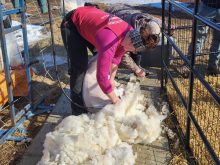Alberta Pork is reviewing its membership in the national organization following a dispute over whether to align with the Canadian Agri-Food Trade Alliance.
Delegates passed a resolution to review its participation in the Canadian Pork Council following a lengthy debate at the annual meeting in early December.
Two years ago the pork council directors voted 11 to eight in favour of joining CAFTA. Martin Rice, manager of the Canadian Pork Council, said the board executive voted not to proceed, which angered Alberta. There were some concerns over CAFTA’s opinions on domestic support that have since been modified.
Read Also

Charges laid after cattle theft
Saskatchewan RCMP lay two charges against a man after six cattle went missing.
The pork council is already a member of the Canadian Federation of Agriculture but some Alberta delegates feel less affinity for that group with its support of supply management and defence of tariffs and import duties, said Phil Mueller of Lacombe.
“Open trade is essential to Alberta,” he said. Alberta and Sask Pork joined CAFTA on their own.
“This isn’t a threat but it is something we want to send to CPC that Alberta is getting very distressed over the lack of governance,” he said.
Some Alberta delegates worried about making idle threats because if provinces withdraw their membership, it could sabotage national programs like Canadian Quality Assurance, traceability and safety nets.
Jack Moorman said losing a member could have wider ramifications and he does not want to lose the other benefits from national affiliation. He is opposed to pulling out of the council but wants changes to ensure the organization acts on majority decisions.
“To threaten to leave that entire organization and be serious about it, I would say we need to take a hard look at that before we make that kind of decision,” Moorman said.
Alberta sends three delegates to the national level and believes it is not the only frustrated member.
“We really burned up a lot of capital by not joining CAFTA,” said Alberta manager Ed Schultz.
“Supply management needs import quotas to survive, but at the same time their activities have made it difficult for us to make any progress,” said Schultz.
In a more collaborative motion,
Alberta Pork delegates resolved to investigate merging some operations with Sask Pork.
With one viable packer left, delegates agreed there are common concerns over labour recruitment and the possibility of sharing staff.
Alberta already shares some advertising programs with Ontario and by aligning with Saskatchewan, a bigger block of producers could be more effective at the national level, said delegate David Hospers of Neerlandia.
Hog group managers from western provinces are already meeting and recently they started a slaughter database of the three prairie provinces, said
assistant manager Paul Hodgman.
“We need to do this wherever possible,” he said.

















